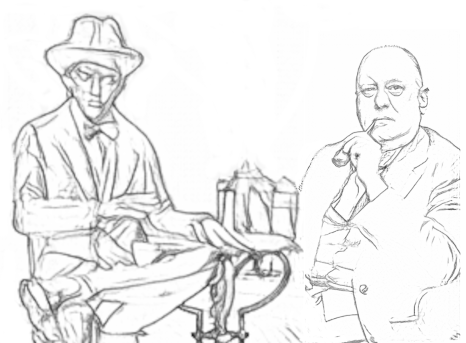
Aleister Crowley and Fernando Pessoa
Aleister Crowley, occultist and mystic, crossed paths with Fernando Pessoa, the renowned Portuguese poet and writer, in the early 20th century. Their interaction was marked by a fascinating exchange of ideas, primarily centred around esotericism, mysticism, and the occult. Crowley, known for his involvement in various mystical orders and his controversial teachings, found in Pessoa a kindred spirit with a profound interest in exploring the depths of consciousness and the mysteries of existence.
Pessoa, a master of heteronyms and intricate literary personas, engaged with Crowley’s ideas through his writing, incorporating themes of mysticism and spirituality into his works. It is evident from Pessoa’s writings that Crowley’s influence left a significant mark on his philosophical and metaphysical inquiries. Crowley’s provocative views on magic, religion, and human potential resonated with Pessoa’s existential musings, enriching his literary explorations with a deeper, more enigmatic dimension.
Their interaction symbolises a meeting of minds from vastly different backgrounds yet united in their quest for transcendence and understanding. Crowley’s unorthodox approach to spirituality and Pessoa’s introspective literary genius intersected, sparking a dialogue that continues to intrigue scholars and enthusiasts alike, illuminating the multifaceted landscape of human consciousness and creativity. Through their exchange, Crowley and Pessoa contributed to a shared legacy of intellectual exploration, pushing the boundaries of conventional thought and inspiring generations to delve into the mysteries of existence.
Over time, it is our intention to extend this space with pointers to what is known and speculated about the interaction between these two. To that end, I leave you with the following passages:
Aleister Crowley:
Do what thou wilt shall be the whole of the law.
Love is the law, love under will.
There is no law beyond Do what thou wilt.
Fernando Pessoa:
Therefore the Law is: (1) to discover what we are, in order to know what we intimately and truely want, independently from what we suppose that we want, or that we judge that we should want; (2) to conform all our thoughts, emotions, and impulses to our intimate and true will, excluding all other thoughts, emotions, and impulses, pleasant as they may be, or useful as they may seem, because they are not ours, but only pleasant, and sometimes useful; (3) having done this, to refuse systematically all outer action which doesn’t serve the aims of our true will, refusing to yield to the requests of the so-called duty, to the calls of humanity, and to the fears of ridicule and of the insults.